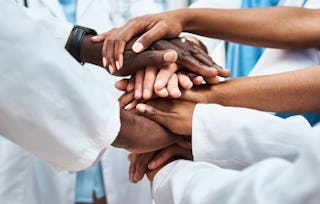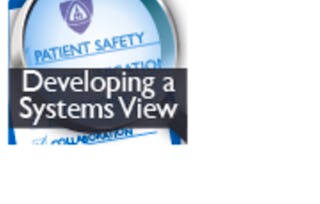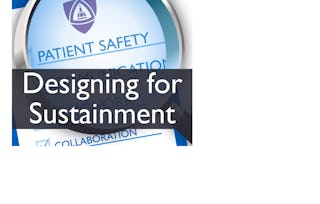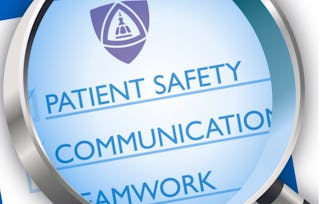Safety culture is a facet of organizational culture that captures attitudes, beliefs, perceptions, and values about safety. A culture of safety is essential in high reliability organizations and is a critical mechanism for the delivery of safe and high-quality care. It requires a strong commitment from leadership and staff. In this course, a safe culture is promoted through the use of identifying and reporting patient safety hazards, accountability and transparency, involvement with patients and families, and effective teamwork.

Setting the Stage for Success: An Eye on Safety Culture and Teamwork (Patient Safety II)
Ends soon: Gain next-level skills with Coursera Plus for $199 (regularly $399). Save now.

Setting the Stage for Success: An Eye on Safety Culture and Teamwork (Patient Safety II)
This course is part of Patient Safety Specialization

Instructor: Eileen Kasda
12,361 already enrolled
Included with
(449 reviews)
What you'll learn
Review essential elements of a safety culture.
Describe how healthcare organizations identify and mitigate safety hazards.
Identify how patients and family members contribute to developing a safety culture.
Identify strategies for improving communication and teamwork .
Skills you'll gain
Details to know

Add to your LinkedIn profile
4 assignments
See how employees at top companies are mastering in-demand skills

Build your subject-matter expertise
- Learn new concepts from industry experts
- Gain a foundational understanding of a subject or tool
- Develop job-relevant skills with hands-on projects
- Earn a shareable career certificate

There are 4 modules in this course
In this module, learners will develop an understanding of what safety culture is and why it matters, how safety culture influences outcomes, how culture is assessed, and how strategies for improvement can be developed. Learners will become familiar with the Just Culture model and how it is used when appropriating blame and accountability for human error, at risk behaviors, and reckless behaviors.
What's included
6 videos2 readings1 assignment
The patient experience encompasses a range of interactions patients have with the healthcare system. Understanding patients' expectations and learning from their experiences is key to designing safer care delivery systems and providing patient and family-centered care.
What's included
6 videos4 readings1 assignment
Patient safety event reports are a critical data source for identifying and mitigating harm in high reliability organizations; yet, many healthcare organizations do not take full advantage of this data. At the conclusion of this module, learners will understand how event reports should be used to design safer care systems and how organizations can provide support to staff involved in medical errors.
What's included
12 videos2 readings1 assignment1 discussion prompt
Research shows that many errors can be attributed to breakdowns in teamwork and communication. In this module, participants will learn how safety culture can be strengthened though teamwork and communication. Participants will learn skills critical in the prevention and mitigation of medical errors.
What's included
8 videos3 readings1 assignment
Earn a career certificate
Add this credential to your LinkedIn profile, resume, or CV. Share it on social media and in your performance review.
Instructor

Offered by
Explore more from Healthcare Management
 Status: Free Trial
Status: Free TrialJohns Hopkins University
 Status: Free Trial
Status: Free TrialJohns Hopkins University
 Status: Free Trial
Status: Free TrialJohns Hopkins University
 Status: Free Trial
Status: Free TrialJohns Hopkins University
Why people choose Coursera for their career




Learner reviews
449 reviews
- 5 stars
82.18%
- 4 stars
16.25%
- 3 stars
0.66%
- 2 stars
0%
- 1 star
0.89%
Showing 3 of 449
Reviewed on Jun 29, 2019
Lots of learning, lots of high yield information.y Certainly getting us a level up in the patient safety scale !
Reviewed on Aug 30, 2020
I never thought about presentation simplicity and smooth flow. Well presented and balanced course about safety culture and Team approach.
Reviewed on May 14, 2019
It is a course with valuable and important information for the strengthening of patient safety systems. I loved!
Frequently asked questions
To access the course materials, assignments and to earn a Certificate, you will need to purchase the Certificate experience when you enroll in a course. You can try a Free Trial instead, or apply for Financial Aid. The course may offer 'Full Course, No Certificate' instead. This option lets you see all course materials, submit required assessments, and get a final grade. This also means that you will not be able to purchase a Certificate experience.
When you enroll in the course, you get access to all of the courses in the Specialization, and you earn a certificate when you complete the work. Your electronic Certificate will be added to your Accomplishments page - from there, you can print your Certificate or add it to your LinkedIn profile.
Yes. In select learning programs, you can apply for financial aid or a scholarship if you can’t afford the enrollment fee. If fin aid or scholarship is available for your learning program selection, you’ll find a link to apply on the description page.
More questions
Financial aid available,





